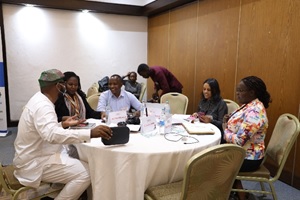Contact Info
- 6th Floor, I & M Building 2nd Ngong Avenue, Upper Hill
- +254 (0)20 2985000; +254 (0)729 111031 / +254 (0)731 000065
- info@pasgr.org
- Office Hrs: Today 9.00am to 6.00pm
Lack of meaningful engagements between researchers and policy practitioners have often stifled policy making efforts in Africa. As a consequence, research and policy making processes have always operated in silo formats, limiting cross learning and by extension effective policy making and programming. Across Africa, the need to integrate research evidence in the conversations and practices around policy making is urgent. Effective policies, founded upon concrete evidence is not only useful in sealing current knowledge gaps but also in stimulating Africa’s growth and development. Whereas evidence has been found to propel the legitimacy and efficiency of decision making, the ambiguities surrounding evidence-to-policy processes has often jeopardized access and use of evidence.

PASGR’s Utafiti Sera (Research Policy) model has achieved tremendous milestones in providing platforms and safe spaces for stakeholders to collaborate and engage in evidence generation and sharing for greater uptake and use. The model works across three cross-cutting objectives including; (a) Establishing and sustaining vibrant research-policy communities through effective research-to-policy partnerships; (b) Engaging key policy actors and practitioners through direct interactions, advocacy and the use of ‘champions’; and (c) Generating new research evidence and/or synthesising existing ones, and enhancing dissemination through integrated channels.

Utafiti sera adapted new approaches in engaging and influencing policy dialogues. Informed by knowledge needs of policy actors and a robust understanding of the policy environment, conceptualization of Utafiti Sera was catalyzed by a seed grant from the Dutch Knowledge Platform on Inclusive Development (INCLUDE). Conscious of the diverse power and interests held by multiple stakeholders, Utafiti Sera integrates mechanisms for facilitating dialogues amongst key stakeholders, build consensus and establish collaborative pathways for advancing policy changes. Additionally, the model incorporates collective synthesis, packaging and dissemination of information using appropriate communication channels and medium. To catalyze the processes of evidence translation and policy uptake, the framework explores use of policy champions to strategically package and position emerging evidence for adoption.
The model seeks to mainstream a culture of evidence use in decision making at all levels. The design of Utafiti sera was guided by a number of principles including the acknowledgement that evidence exists in different types, the importance of engaging multiple stakeholders, and effective social and political awareness as a way of increasing the relevance of evidence in policy making processes. Since its inception in 2015, Utafiti Sera has undergone crucial transformations to refine its approach and make it more effective. Overall, this has taken place in four distinct phases: (a) Initial conceptualization of the model, that was marked by brainstorming and ideation; (b) Phase 1 implementation of Utafiti Sera, interventions in the Social Protection Sector and Youth Employment Creation in Kenya and regionally at the African union level; (c) Utafiti Sera Phase II; and (d) Utafiti Sera Phase III.

Using the concept of a ‘House’ as a convening place for researchers, policy makers and citizens as well as key institutions such as Universities, governmental and non-governmental organization to engage, Utafiti sera anchors EIDM with certain thematic focus. With foot prints in more than eight countries, PASGR’s evidence to policy communities have exponentially grown over the years from just two Houses in 2015 to 6 Houses in by the end of 2022. These include Urban Governance and City Transformation House in Kenya and Kigali; Youth Employment Creation; Youth Aspirations and Resilience; Social Protection; Water Governance House; and Action for Empowerment and Accountability House amongst others. Considering the successes and impact of the implementation of the model, the implementation of Utafiti Sera is rapidly expanding. Beyond the existing Houses, Phase IV of Utafiti Sera, which begins in March of 2023, will include an additional House focusing of Universal Health Coverage. This also will see the expansion of the model into new geographical and thematic territories.

To take stock of the transformational journey, record the successes and reflect on existing challenges to accelerate actions towards acculturation of EIDM, the Utafiti Sera programme has organized a Leadership and Learning convening between 20th and 23rd February, 2023, at Ciala Resort Nairobi. The convening themed “From Lessons to Best Fit Practices in Evidence-Informed Decision Making’’, will bring together about 30 participants including researchers, community representatives, policy makers, government officials and programmatic practitioners. Additionally, the convening will review capacity gaps in articulating EIDM and establish mechanisms to address these while taking into account prevailing circumstances, risks and contextual realities to anchor Utafiti Sera Phase IV. It is expected that the convening will enable participants to refine and strengthen the Utafiti Sera model.
A4EA AAU advanced research design African universities agriculture Applied Quantitative Methods APSP ARD CABE call for applications cash transfers COVID-19 employment energy EOI Featured higher education IDS INCLUDE Job opportunity LEAP Africa MMRC MRPP opportunities opportunity PAMOJA TRUST partnerships PASGR PDT pedagogy PedaL press release professional development and training professional training public policy Research research methods scholarships social protection Social sciences University of Ibadan University of Pretoria utafiti sera vacancy Youth employment

6th Floor, I & M Building
2nd Ngong Avenue, Upper Hill
P.O. Box 76418-00508
Nairobi, Kenya
Email: info@pasgr.org
Tel: +254 (0)20 2985000;
+254 (0)729 111031 / +254 (0)731 000065
Legal counsel provided by Hurwit & Associates and Muthoga Gaturu & Co. Advocates
Leave A Comment